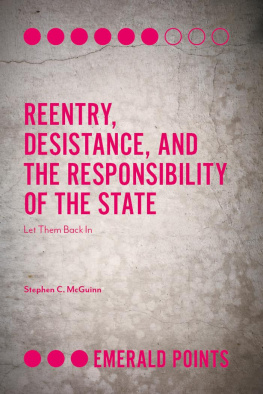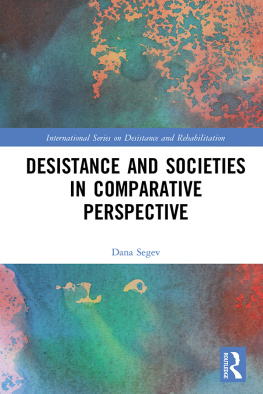REENTRY, DESISTANCE,
AND THE RESPONSIBILITY
OF THE STATE
REENTRY, DESISTANCE,
AND THE RESPONSIBILITY
OF THE STATE
LET THEM BACK IN
BY
STEPHEN C. MCGUINN
Quinnipiac University, USA

Emerald Publishing Limited
Howard House, Wagon Lane, Bingley BD16 1WA, UK
First edition 2018
Copyright 2018 Stephen C. McGuinn. Published under exclusive licence by Emerald Publishing Limited
Reprints and permissions service
Contact:
No part of this book may be reproduced, stored in a retrieval system, transmitted in any form or by any means electronic, mechanical, photocopying, recording or otherwise without either the prior written permission of the publisher or a licence permitting restricted copying issued in the UK by The Copyright Licensing Agency and in the USA by The Copyright Clearance Center. Any opinions expressed in the chapters are those of the authors. Whilst Emerald makes every effort to ensure the quality and accuracy of its content, Emerald makes no representation implied or otherwise, as to the chapters suitability and application and disclaims any warranties, express or implied, to their use.
British Library Cataloguing in Publication Data
A catalogue record for this book is available from the British Library
ISBN: 978-1-78769-322-7 (Print)
ISBN: 978-1-78769-319-7 (Online)
ISBN: 978-1-78769-321-0 (Epub)

CONTENTS
ABOUT THE AUTHORS
Steve McGuinn is an Assistant Professor of Criminal Justice at Quinnipiac University. He received a Bachelor of Arts in Philosophy (A.B.) from the University of Chicago, a Master of Science in Social Work from Columbia University, and a PhD in Criminology and Criminal Justice from the University of Maryland, College Park. Prior to pursuing his doctorate, he worked as a mental health professional and as an Assistant Unit Chief on Rikers Island in New York City. Every fall, he teaches an Inside Out Prison Exchange seminar in a maximum-security prison in Connecticut.
Anton Carcera (alias) spent 11 years in prison for armed robbery. He was released in 2017.
INTRODUCTION: LET THEM BACK IN
We clearly like prison in the United States. We put a lot of people in prison. We use prison to punish people. We punish people for crimes they have committed and we punish them for who they are we have data that tells an ugly story about our justice system: we like to incarcerate people of color; we like to incarcerate the poor; we like to incarcerate the uneducated (National Research Council, 2014; Pettit, 2012; Sampson & Loefler, 2010). It might have been their choice they might have chosen not to complete high school; they might have chosen to sell drugs on the corner; and they might have chosen to engage in criminal acts and to act up and to act out against their community, their families, our world. They may have picked up guns, hustled, threatened people. They may have done bad things. This may all be true. I do not deny this.
And I do not excuse these actions. I am horrified and disgusted by many criminal actions. I want to protect my family; I want people to not do terrible things to one another or to people I know or to people that I do not know. I do not want terrible and unnecessary things to happen to people. I do not want the world to be
- violent;
- angry;
- vindictive;
- helpless;
- hopeless;
- meaningless;
- fearful.
I abhor violent criminal action. The pain people cause each other overwhelms me. But I do not confuse crime with criminal; I do not simply negate context because it is less complicated; and I do not wish to revisit the pain of the victim on the victimizer. He should be forced to be like us. He has no right I give him no right to make me like him.
But this is not so easy for us because we are emotional and caring and rational and we are emotional and hurtful and irrational. And crime is intimate to us it is not theoretical, magical, philosophical. We feel crime and it is often extraordinarily painful, debilitating, horrific. I recognize the intimacy of crime, how deeply it impacts our lives, transforms our trajectories, leaves us emptied, hopeless, primal. I recognize that pain.
- We are angry;
- We are harmed;
- We are in shock;
- We bleed.
We have been harmed. Crime is an affront. My instinctive reaction to being hit is to hit back. The attack is personal; so, the need for retaliation is also personal, even human. And this reaction is directed toward someone, toward the bad actor. The need for punishment therefore is also intimate. It is intimate because it is a response to pain. The act was done to me. The need for retaliation is human. And my resulting call for blood may even be a socially acceptable albeit legally unacceptable response.
I react to your action and attempt to repeat your action onto you.
I understand this desire; so do most people. But crime, even violent crime, is not simply an attack of one against another. These isolated, individual attacks are often considered to be attacks on our very way of life, our existence. Due to the threats they pose to our collective health and well-being, individual attacks often represent challenges to who we are as people. They are attacks against our very social fabric. In such an adopted equation, no reaction is too big. This becomes: your violence has challenged the right for our state to exist.
And this does not lead us to good places. This really is not a good way for us to begin the punishment exercise. If we feel strong solidarity with victims, then we probably do not want to repeat the actions of the victimizer. A state that hits back violently, viciously, brutally engenders fear, not love and loyalty.
We do not actually want to do violence to people.
The general collective may want a symbolic representation of suffering to sate their imagination but not necessarily an actual instrument of barbarism. Indeed, we would be prudent to reject demonstrations of physical violence. We want to assign blame for horrific action, we want to judge, and we want to mete out or believe we are meting out harsh sentences. In part, I think we have learned some of the dangerous lessons of the past; how the visible and physical attack of the body can undermine state authority (see, e.g., Foucault, 1975). But I also believe that the practice of punishment is not actually intimate to the punisher.
- It is cold;
- Calculated;
- Removed;
- Robotic;
- Unmoved.
In practice, we distance ourselves from the punished individual. Isolate him and give him an indistinct uniform, an unremarkable cell. This de facto dehumanization allows us to discard or at least disregard the punished, and by connection, our pact with the punished. He essentially becomes an outcast. By his actions, he attacked the delicate skin of the state. I am reminded only of his transgression and not of his individuality. I am not forced to consider him. He becomes part of the collective of people who reject our way of life through illicit action; he joins a team defined only as pariah, with public suspicion deeming them all traitors.
Of course, none of this thinking serves us very well. It is a terrible way to approach punishment. We should think differently. We will get better results. Here, I promote two overlapping philosophical improvements to our punishment thinking:





